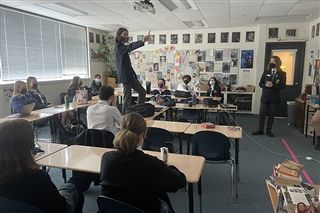Curriculum is developed with a variety of factors in mind, not the least of which are student interests and strengths. It was thus with exuberant confidence that I planned for a deep dive on the works of Thomas King to begin the year and a follow-up with Eden Robinson’s Monkey Beach in the winter, two essential Indigenous voices in literature and two authors that will reward the keen analytical minds and empathic hearts of this particular group of literary scholars.
Over the summer, IB English Literature 12 students listened to King’s 2003 CBC Massey Lectures “The Truth About Stories” as a background to our upcoming study of his novel Green Grass, Running Water. In between our September lecture debrief and our October novel study, we have enjoyed a student-takeover of the classroom: small groups are leading their peers in hour-long seminars, each focusing on a short story infused with magical realism, an autobiographical excerpt, or a portion of King’s non-fiction work The Inconvenient Indian. Ambitious plans—but that is the curriculum this group inspires!
Each seminar includes a reading or performance of King’s work, an academic run-down of characters and motifs, and a series of questions to inspire the group’s further thinking. Imagine, if you will, a chuckling totem pole brought to life in the classroom, or that sly trickster Coyote infiltrating our four walls. As a teacher, it has been a joy to pass the reigns to such capable students for this very important work: it has been fascinating to participate in student-led discussions on colonialism and the roles of storytellers and media, and I was thrilled but unsurprised to hear how Literature 12 students led conversations about King’s work on Orange Shirt Day. They are a generation of passionately compassionate leaders. Quite appropriately, I leave the rest of this article to the voices of our exceptional Lit 12-ers.
What did you think of your assigned story? How does it compare to other stories by King? Did your perspective or opinion change as you studied this story or listened to other presentations?
-
We all thoroughly enjoyed reading and performing this story. Many structural aspects were embedded within King’s writing, which makes all his texts entertaining to read. Along with the aspects of historical fiction, the “Enemy Aliens” story also contains fictional characters and elements that help to promote King’s style. His other texts help to enforce this idea, especially as he consistently uses his characters and structures to address deeper societal issues.
-
In “Borders”, King raises an interesting point about how the media can play a voice in the outcome of people’s stories, whereas in some of his other works, the resolution of stories generally stems from the characters’ own actions. – AngelinaWhat was the most difficult part of creating your performance and your presentation?
-
When studying for my role of the totem pole, I reverted to using method acting. By studying speaking and singing totem poles, and living my life as one, I could really encapsulate a totem pole for the audience. Also holding my arms up for that long hurt. – Mackenzie Editor’s note: She stood in the corner with photos taped to her for days.
-
I think deciding what and where to cut out parts of the story was challenging, and honestly I think it affected the class’s understanding of the story as a whole. – ConnorWhat has been the most interesting tidbit gleaned from the group discussion?
-
I would say the most interesting tidbit from all the class discussions was the comparison of King’s non-fiction chapter, “Forget Columbus”, with Sartre’s No Exit and Fitzgerald’s The Great Gatsby. It was a very interesting idea and led to diverse perspectives in discussion. – Connor
-
One thing we found is that the narrator [in “Borders”], while being the son of the mom, is actually somewhat representative of much of the public at that time. What makes it even more interesting is that the son was Thomas King when he was younger. The son is easily persuaded by the various, and somewhat manipulative, border guards and even tries to sabotage the mom’s stubborn stand against the government by telling the border guards that they are Canadian. The narrator also seems quite nonchalant about the whole ordeal and doesn’t really take sides, not supporting his mom really at all, which could have led to the mom giving up and not being successful in her protest. King is sending the message to readers about the importance of public education and support, and the benefit and impact that support can have. – QuinnHave you learned anything new or confirmed anything you know about public speaking and presenting to a group? What did you find most engaging or admirable in the other presentations?
-
I found the reading of “Enemy Aliens” incredibly interesting and compelling, and would love to take that idea and utilize it in future readings of stories. While not applicable to public speaking as a whole, it lends itself well to poetry, stories or even a slam poem (in my opinion). – ConnorAs a final capstone, looking forward to writing an HL Essay later in the year, students are drafting a series of ‘blog posts’ through Blackbaud to explore their ideas and share them across the class for feedback. In particular, students have been encouraged to consider their own lenses in reading this story—how their own lived experiences shape the way they read and react to these characters, and how they can step outside that experience in order to examine the text from different perspectives.
-
Indigenous vs. Western Cultures: The passage takes a brief break when Eli watches a Western movie on tv. This references the stereotypes Indigenous people are subject to, some of which stem from the way they are portrayed in Western movies. Eli questions how much of an impact Western culture has had on him, and if he still feels like an Indigenous person in the same way people that live on the reserve do. There is a sense of reflection when Eli hears about all he has missed from his family. However, Eli doesn’t directly admit his opinions about this. After leaving the ceremony, Karen refers to life on the reserve, saying “you must miss it”. Eli doesn’t respond, implying that Eli feels conflicted, as he drives away and doesn’t look back. While Karen “found her voice” over the course of the trip, Eli stayed relatively quiet. Despite knowing more about Indigenous culture than Karen, he hasn’t been kept up to date on what’s been happening in his home community since he left years prior. This often leaves him in a solitary state, as he stays “just outside the lodge”, secluded from others. Further, the passage raises the question of whether it is possible for a person to have a blend of two cultures, or if, once they commit to a new culture, they can’t go back.
- Allusion and Origin Stories: The line “In the beginning” rings in my ears (as a former Sunday school attendee) as the start of long, boring lecture. These three words are intrinsically connected to the origin story of the Christian faith, even for people with relatively little exposure to it. The introduction of this famous phrase with “So.” softens the delivery, and makes the narrator seem more fallible (as they use common “um, buts” just like humans). Some would view the end of the line, “Just the water”, as a connection to Indigenous tradition and the origin story of the turtle, however, many forget that the water is also the first physical element of the Christian world as well: “darkness was over the surface of the deep, and the Spirit of God was hovering over the waters” (Genesis 1:1). Instead the water demonstrates the similarities between stories as opposed to simply a connection between two separate entities. Further, the parallels between a Christian God and Coyote/Coyote’s Dream are obvious. Both Coyote and God exist at the beginning of time, floating on the surface of the water, Coyote’s dream explicitly asking, and being referred to, as GOD for the remainder of the novel. The last line on page 3 “‘That’s true,’ I says. ‘And here’s how it happened’”, takes the tone of decision, of a didactic assurance. Often when discussing Indigenous stories they are referred to as just that: stories. Instead, King approaches this revised origin story as a way of thinking, a truth, integrating the decisive writing style of the biblical texts to convey a similar sense of importance.
-
An ‘accessible’ Indigenous text: One of the reasons why Thomas King is taught in Western literature is because of his writing’s ‘accessibility.’ Now, accessibility can mean a multitude of things to you when it comes to literature, but in short, it signifies a piece of literature that is easy to read for the majority of people. What makes literature accessible? In King’s case, it is the language and structure he utilizes throughout all of his books. King also utilizes structure in this novel to add another aspect of ‘friendliness’ to it. The circular style of storytelling shown in Green Grass Running Water is one major example of this. Throughout the body of the novel, King grounds readers in the image or idea of traditional storytelling when featuring the Lone Ranger, Ishmael, Robinson Crusoe and Hawkeye in between different sections of the larger story. This added aspect creates a more personal connection for the reader, ensuring a more comfortable or accessible reading experience. King’s artistic simplicity allows more focus to go towards the larger, deeper stories this novel discusses. Mostly noticeable when the storytellers are present, the simplicity and bluntness of the text allows readers to clearly picture what is happening. On page 49, when the storytellers are speaking amongst themselves, King presents the conversation as it is.“Are we waiting for something?” said Ishmael.“A ride,” said the Lone Ranger.“How long do we have to wait?” said Robinson Crusoe.“Not long,” said the Lone Ranger.This conversation is displayed in the most simplistic way possible and while it could be seen as boring, the scarce yet somewhat constant use of it may help readers organize their thoughts. Especially if they are not used to King’s writing. These aspects make this novel an easier read, making King’s work an accessible gateway for those who are wanting to commence their journey into the world of Indigenous literature.
-
-
-
-
-
-
-





